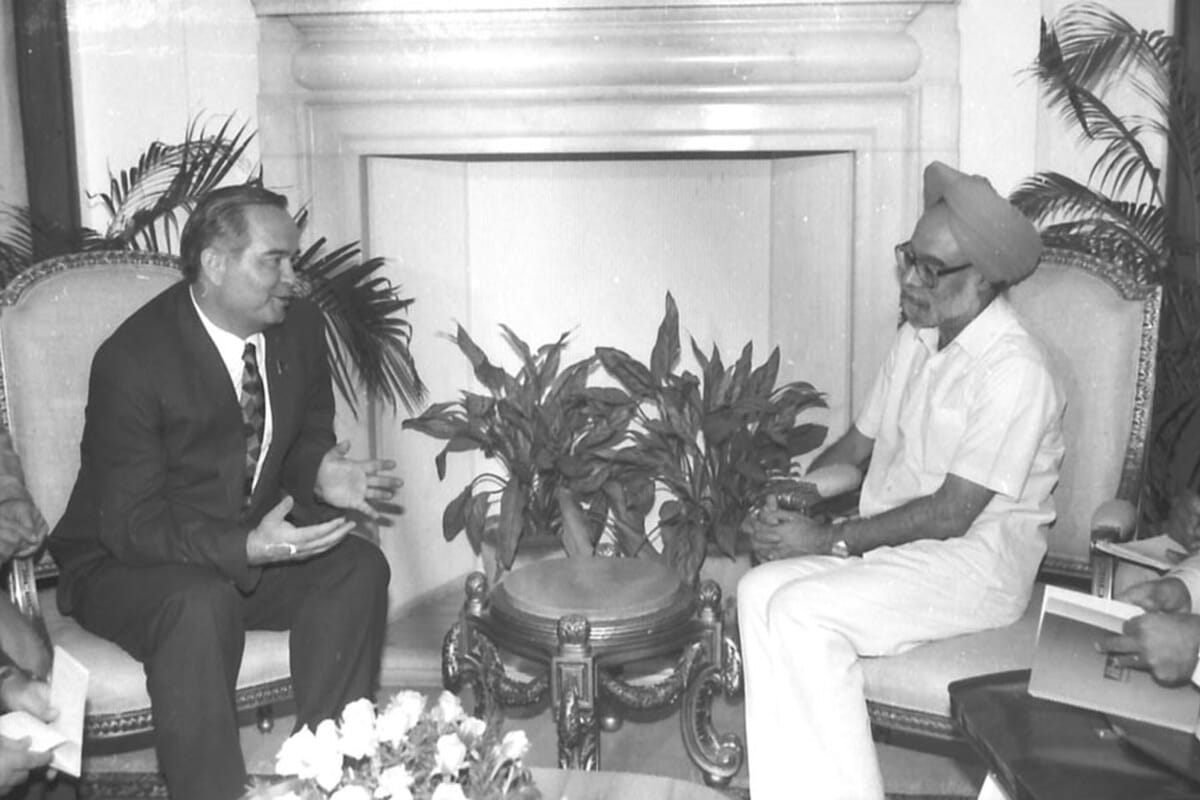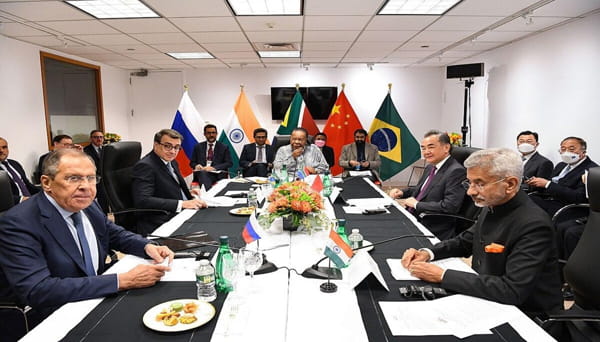
Former Union Finance Minister Dr. Manmohan Singh (R) with former President of Uzbekistan, Mr. Islam Karimov, in New Delhi on August 27, 1991
Introduction
In 1991, the five Central Asian Republics (CARs) emerged as ‘independent’ sovereign nations as an outcome of the collapse of the Soviet Union. These nominal ‘Soviet Socialist Republics’ were ruled by the local branch of the Communist Party of Soviet Union and overnight their leaders as well as the party apparatus re-invented themselves as champions of a national identity with a civilizational, historical and cultural legacy dating back to the Mongols and Turks.
There was cultural affinity with India, a familiarity with Indian ethos through Indian cinema and a lingering legacy of Babur as the conqueror of India. The warmth of the India-Central Asia political relationship was built on this strong foundation and has been nurtured by successive governments and leaders on both sides.
The Soviet Communist legacy of ‘atheism’ has continued in the CARs, but gradually the Central Asian identity today has evolved into a mix of Central Asian, Islamic and Turkic identity. Buddhism and Zoroastrianism are acknowledged as part of the history of the ancient past, but any religious or civilizational connection with the present is avoided.
While the five CARs continue to have a strong secular Constitution and polity, the Islamic identity is gradually gaining significance. In a Round Table on ‘Uzbekistan’s Foreign Policy: Towards Peace, Openness and Development’ in Tashkent on 25 October 2024, Uzbek First Deputy Minister of Foreign Affairs, Mr Bakhromjon Aloyev said that Uzbekistan will focus more on building relations with the Islamic Countries, particularly from the Middle East and Gulf as it had ‘shared values’ with them.
Kazakhstan, Kyrgyzstan and Uzbekistan are exploring their Turkish roots with the assertion of their Turkic identity through membership of ‘Organization of Turkic States’. These trends may have a negative impact on CARs robust cultural relations with India.
Quest for Strategic Autonomy
The five CARs have been successful in establishing sovereign constitutional Republics with well-defined boundaries. India helped in this initial nation building process by quick recognition as independent countries in 1991 and inviting the leaders of all five Republics giving them full Presidential honours.
CARs view India as a strong partner in assertion of their ‘strategic autonomy’. The domination by the Czarist Russia in the 19th century and then the Soviet Union rankled with them and they zealously guard their freedom of action and decision making. The CARs are clearly not willing to accept any domination by China despite some degree of economic dependence on China of Tajikistan and Kyrgyzstan.
In organisations like Shanghai Cooperation Organization (SCO), India comes as a balancer in support of the four Central Asian members and this role is valued by them. India must remain strongly committed to SCO despite the reality that the organisation is not of much direct benefit to India. The absence of the Indian Prime Minister Narendra Modi from the SCO Summit in Astana in June 2024 was not well received by President Kassym Tokayev in particular and the CARs in general.
Connectivity
While India is pushing for the International North South Transport Corridor (INSTC) between India, Iran, Turkmenistan/Afghanistan, Central Asia, the CARs, particularly Uzbekistan are aggressively working to establish a railroad from Termez in Uzbekistan to Kabul and onwards to Peshawar in Pakistan.
President Shavkat Mirziayev of Uzbekistan had organised a big international conference in Tashkent in July 2021 to pursue this proposal. Uzbeks seek India’s support for this project despite Pakistan blocking any transit of goods towards India. The Uzbeks argue that one branch of this railroad will go towards Herat and Iran which could be used for Indian freight. To help smoothen the process for connectivity between Central and South Asia, Uzbekistan was invited for the first time in India-Pakistan Track-II dialogue at Manama hosted by International Institute for Strategic Studies.
Trade and Investment

Meeting of BRICS Ministers of Foreign Affairs, September 2022.
Despite significant political support and goodwill in the region, India’s investment in CARs has been modest. Trade between India and CARs is a little over US$ 2 billion compared to CARs trade with China amounting to US$ 90 billion. CARs are also major partners of China’s Belt and Road Initiative (BRI) with major rail and road connectivity projects already complete in Kazakhstan and Kyrgyzstan.
India’s import of substantial quantities of uranium ‘Yellow Cake’ from Kazakhstan and Uzbekistan has added a strategic dimension to this bilateral trade. Indian investments have been in mining, automobile components, pharmaceutical industry and cotton processing from yarn to fabric.
In 2020, India opened a US$ 1 billion line of credit for CARs for development projects in infrastructure, IT, energy and agriculture. But the offtake from this facility has not been encouraging because of the comparatively high interest rates and risk averse mindset of India’s private sector. Sensing this reality, CARs no longer look to India as a major source of investment and have now turned their gaze towards China, Gulf countries and Turkey.
Digital Highway
With the turbulent Afghanistan and an inimical Pakistan impeding freight traffic between India and Central Asia, avenues need to be explored for digital commerce and provision of services like banking and insurance. India has offered its digital public goods like UPI payment, Aadhar card software and expertise to CARs which needs to be pursued.
India has been helping in capacity building of young Central Asians by establishing IT centres in several CARs. There is a proposal to establish an ‘IT/ITES Task Force’ between the IT organisations, IT parks and IT companies of India and CARs to work towards greater digitization and E-Governance. India is poised to be an important partner in the Central Asia Regional Economic Cooperation (CARES) Digital Strategy 2030 to upscale CARs digital technological capabilities.
A little explored possibility for collaboration in ITES is the possible joint ventures between Russian, Uzbek and Indian software companies to offer IT services for the Russian market with online delivery from Tashkent or Dushanbe. About 300,000 Russians, many from the IT sector, have moved to Uzbekistan in the last two years to avoid being drafted in war against Ukraine and opened companies in Tashkent and other major cities. Indian software can be customised for Russian consumers with the Russian language skills of low cost Uzbek/Tajik professionals. This would open new employment opportunities for Russian knowing IT experts from CARs.
Defence
The scope of co-operation between CARs and India in the defence sector is rather limited. CARs have little cutting-edge technology to offer and would not have the money to buy Indian defence equipment. The focus, therefore, is on joint training and anti-terrorism exercises. The Ayni Airbase in Tajikistan, upgraded by assistance from the Indian Air Force has not come up to expectations in its utility for India.
Future Roadmap
There is an air of stagnation and modest achievements in India-CAR engagement in the last three decades. This needs to be recognized and addressed. Even Bollywood is losing ground and Turkish and Korean films and TV serials are more popular among the youth of CARs.
The Delhi Declaration adopted after the first India-Central Asia Summit on 27 January 2022 had adopted an ambitious agenda for more trade and investment as well as development Cooperation. It advocated security and defense collaboration particularly to counter ‘cross-border terrorism’ and financing. It also decided to boost cultural ties and people to people contacts with a proposed visit of 100 youth from CARs to India each year.
Close economic co-operation and strategic understanding between India and CARs is essential for regional security and prosperity. An effective architecture for India-CAR co-operation is already in place. The task before all the stakeholders is to think of innovative forms of collaboration so that this relationship realises its high potential.
(Exclusive to NatStrat)